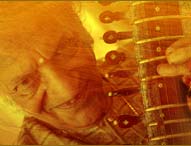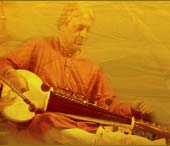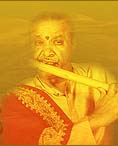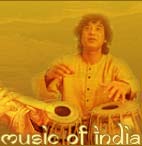Born On: September 16, 1916
Born In: Kunjamma, the temple city ofMadurai, Tamil Nadu
Died On: December 11, 2004
Career: Classical Singer
Nationality: Indian
M. S. Subbulakshmi, Madurai Shanmukhavadivu Subbulakshmi, was one of the most famous and admired vocalists in the field of Carnatic music. She was the first Indian musician to receive the 'Bharat Ratna' and also the first woman recipient of the title 'Sangeetha Kalanidhi'. She was popularly known as 'Nightingale of India'. Also, she is the first Indian musician to receive the Ramon Magsaysay award, Asia's highest civilian award, in 1974. Her interpretation of devotional songs was marvelous and used to mesmerize listeners and send them into a world of trance. M. S. Subbulakshmi was synonymous to Carnatic music.
Early Life
M. S. Subbulakshmi was born on 16th September, 1916 in Kunjamma, the temple city of Madurai, Tamil Nadu. She belonged to a musician family. Her grandmother played the violin and her mother was a veena artist. Subbulakhsmi's interest in music developed from her childhood. Her first recording was released when she was only ten years old. In 1940, she was married to T. Sadasivam, who was freedom fighter and a follower of Rajaji. He played a very crucial role in enhancing her career.
Career
M. S. Subbulakshmi received her training in Carnatic classical music from 'Semmangudi Srinivasa Iyer' and Hindustani classical music from 'Pandit Narayanrao Vyas'. Her first recording was released when she was ten years old. Six years later, at the age of sixteen, she gave her first public performance at Kumbakonam during the Mahamaham festival. Next year, she gave the performance at Madras Major Academy, the renowned center for the study and promotion of Carnatic music. Apart from singing in Kannada which was her mother tongue, Subbulakshmi also sung in different languages such as Hindi, Bengali, Gujarati, Marathi, Telugu, Malayalam and Sanskrit.
M. S. Subbulakshmi also entered the field of acting and performed in various tamil movies. Her first movie was 'Sevasadanam' which was released in 1938. People still remember her for the role in 'Bhakta Meera' (1945). Even today devotional songs of Meera in her pleasant voice are enjoyed by people. Other films in which she acted are 'Savitri' (1941) in which she played the male role of 'Narada' and 'Meera' (1945). The movie, 'Meera' was again made in Hindi in 1947. The music director of this movie was Dilip Kumar Roy and the devotional songs of Meera were sung by M. S. Subbulakshmi.
After some time Subbulakshmi left movies, and completely devoted herself to give performances and to do music concerts. As the Cultural Ambassador of India, she went to foreign countries like London, New York, Canada, the Far East. Her musical concerts at Carnegie Hall, New York (1977); the UN General Assembly on UN day (1966), the Royal Albert Hall, London (1982) and the Festival of India, Moscow (1987) were important milestones of her career. In the year 1969, Subbulakshmi sang in front of every idol in Rameshwaram temple and was given company by Indian Railways Advisor, S. N. Venkata Rao.
Contribution to Music
Few of her most popular works are 'Suprabhatam' (Early Morning Hymns), 'Bhajagovindam' (admiring Lord Krishna) composed by Adi Shankaracharya; 'Kurai OnrumIllai', composition of Rajagopalachari; 'Vishnu Sahasranamam' (1000 names of Lord Vishnu) and 'Hanuman Chalisa' (prayer of Lord Hanuman). The song 'Vaishnava Janato', is said to hold such depth and profundity that it brings tears in the eyes of every listener who listens to it. The way of her singing was very magnificent and hypnotic. She stopped performing in musical concerts after the death of her husband T.Sadasivamon 21st November, 1997.
Death
After suffering from complications related to Pneumonia and Cardiac Abnormalities, she died at the age of 88, on 11th December, 2004 in Chennai.
Legacy
Rishi MS Institute of Engineering and Technology for women is named after the great classical singer MS Subbulakshmi.
Awards & Honors
1954: Padma Bhushan
1967: Ravindra Bharathi Cultural Academy Award
1968: Sangeetha Kalanidhi Award
1974: Ramon Magsaysay Award
1975: Padma Vibhushan Award and was honored as the court-singer of Tirumala Tirupati Devasthanams
1988: Kalidasa Samman Award
1990: Indira Gandhi Award for National Integration
1997: Swaralaya Puraskar
1998: M. S. Subbulakshmi receives the Bharat Ratna; India's highest civilian honor. She was the first musician to receive this award.
2004: Lifetime Achievement Award
Timeline
1916: Born at Kunjamma, the temple city of Madurai, Tamil Nadu
1926: Debuted at Madurai Sethupati High School and first recorded her song
1941: Acted in film 'Savithri' and founded the magazine named 'Kalki'
1945: Tamil movie 'Meera' was released
1947: Hindi movie 'Meera' was released
1954: Awarded with Padma Bushan
1955: Gave concert to raise funds for Kamala Nehru Memorial Hospital
1956: Received Sangeet Natak Academy Award
1967: Bestowed upon with Ravindra Bharathi Cultural Academy Award
1968: First woman to get the title of 'Sangeetha Kalanidhi' from Chennai Music Academy
1970: Vishnu Sahasranamam & Bhaja Govindam Album was released
1974: Got selected to receive the Ramon Magsaysay Award for public service
1975: Received Padma Vibushan
1975: Tirumala Tirupathi Devasathanam's Aasthana Vidwan
1977: Music Concert at Carnegie Hall
1979: Received Honorary Doctorate from Indira KalaSangeetVishwavidyalaya in Khairagarh Madhya Pradesh
1981: Asthana Vidushi by Andhra Pradesh Govt
1982: Festivals of India in London - Concert at Royal Albert Hall
1988: Received Kalidas Samman awarded by the Government of Madhya Pradesh
1990: The Indira Gandhi Award for National Integration
1997: Swaralaya Puraskar; Husband T.Sadasivam passed away
1998: Received the Bharat Ratna
2004: Lifetime Achievement Award on June 21, and died on December 11.






